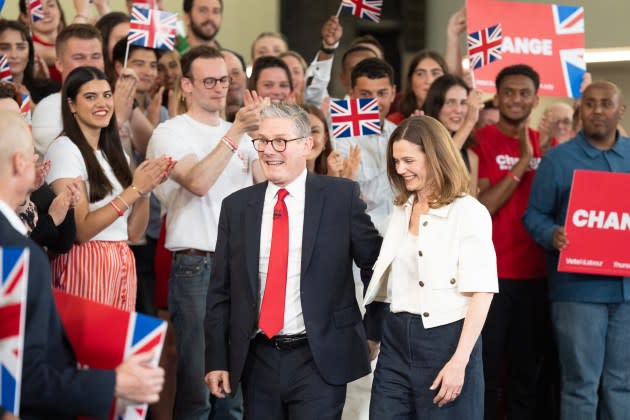The New Culture Secretary’s Agenda: Five Things The UK Film & TV Sector Will Want From Keir Starmer’s Labour Government

After a historic victory for the Labour Party, attention in the film and TV industries now turns to the future.
Following an all-too brief post-Covid boom era, it’s been a particularly tough couple of years for the sector, with the global recession, dual U.S. strikes and market contraction taking effect in a big way.
More from Deadline
Labour’s Keir Starmer is about to select a new culture secretary after shadow elect Thangam Debbonaire’s shock loss to the Green Party, and the incumbent’s in tray will be full to bursting.
Here’s what Deadline believes the industry will be asking for.
Protect and modernize public broadcasters
The UK’s delicate public broadcasters have never been more in need of assistance. In this modern, fragmented era, and with competitors everywhere ranging from the streamers to YouTube to gaming, these bastions of British culture are trying to chart a path forwards. Labour has tended to be noticeably softer in its attitude towards the PSBs than its more free market-leaning Conservative opponents, and in brief remarks during the campaign trail, big beasts have spoken warmly. The Labour manifesto pledged it will work “constructively” with the BBC and other PSBs, and all eyes will turn to a long-gestating funding model review, which has been in the ether for years but repeatedly pushed back. The BBC was hit hard by the Conservatives’ shock decision to renege on its plan to peg the license fee to inflation in 2024 and 2025, which has had a major impact on the corporation’s coffers. Speaking to Deadline today, the Film & TV Charity boss Marcus Ryder, a former BBC current affairs lead, urged “more public money to go to the BBC along with a re-examination of the license fee so it is more progressive and less regressive.” BBC bosses will now be hoping Labour is listening, and work can begin on securing a future for its under-threat funding model, keeping the corporation at the heart of British culture. Simultaneously, it will be intriguing to see how Labour approaches the thorny issue of impartiality, which remains in the spotlight, with global shocks such as the Israel-Gaza war taking effect. Former Culture Secretary Lucy Frazer, one of the many Conservative casualties last night, has previously signalled she believes the BBC is “biased,” and this played a major role in elements of the BBC’s recent mid-term review that focused intensely on impartiality. Starmer’s predecessor, Jeremy Corbyn, had an implicit scepticism towards the BBC in this realm, which Starmer doesn’t appear to share. Speaking of impartiality, what next of GB News? Following repeated slaps on the wrist by Ofcom, the former home of Nigel Farage has had a noticeably quiet election. Whether Labour intervenes if this continues will be keeping media commentators interested. Finally to Channel 4, which has had a particularly tough 12 months or so. Labour could feel pressure to speed up the process by which the network is allowed to own the rights to its shows for the first time in 40 years, a key element of the privatization U-turn, unleashed by the just-passed Media Bill. Whatever the political weather, it is a tough time to be a public broadcaster, and the new Culture Secretary will need to remain cognisant.
Tread the culture wars tightrope

Just a week ago, a prominent Conservative cabinet member, Kemi Badenoch, clashed with David Tennant. Badenoch branded the Doctor Who and Harry Potter star a “rich, lefty, white, male celebrity” in response to the Scot telling her to “shut up” due to a disagreement over her views on trans rights – one that has also seen him criticized by JK Rowling. The episode is neatly illustrative of the new lows that relations between the Tories and prominent figures from the arts world have plunged to in recent years, all related to so-called culture wars topics, and many summoning the issue of trans rights. Labour now has a tightrope to walk. It needs to in some senses be seen to be taking a stance on these complex, hot-button questions while getting on with the job of governing. A set-piece speech from Debbonaire several months back contained some clues. The woman who will no longer be the new Culture Secretary said the Tories had spent years “denigrating arts degrees and getting themselves all tied up in culture wars of their own making.” Noticeably, she acknowledged: “I will not be fighting culture wars although I accept I will have to respond to them.” Keeping big stars on side is important for a Labour government, and ringing endorsements from the people audiences see on their screens every day is no bad thing. Culture wars played a big part in the bruising election campaign. Labour will need to keep a check on this noise now that Starmer has the keys to Number 10.
Help freelancers in dire need
According to broadcasting union Bectu’s latest survey, more than two-thirds of the UK film and TV’s freelance workforce is currently out of work, only a smidgeon below the dire state it founds itself in during the dual U.S. labor strikes. Freelancers are in desperate need and the vast majority of observers would say the Conservatives have not provided, although tax credits brought in by Frazer could go some way to helping. But much more is required. Labour’s manifesto said it would “create good jobs and accelerate growth in film, music, gaming, and other creative sectors.” This is coupled with its New Deal for Working People, overseen by indefatigable deputy leader Angela Rayner, which is seeking to overhaul the gig economy and its various precarities. Plenty of good ideas are knocking around. Trade body Directors UK has been pushing for the appointment of a freelance commissioner, who would “represent and defend the interests and concerns of the UK’s 4.3 million freelancers who often fall through the cracks of the UK’s tax, pension and benefits system.” Meanwhile, Ryder has concentrated his asks on freelancer wellbeing, calling for a statutory requirement for high-end TV and film productions to adhere to a mental health framework. Many in the sector mention that greater freedom of movement for the EU, which has been completely curtailed by Brexit, would help, but Labour has in recent days sought to distance itself from any return to pre-Brexit days of yore and it is unlikely there will be much change in this regard. Labour has talked sycophantically about the strength of the creative industries in the wider economy and will need to work quickly on safeguards amid a freelancer crisis.
Get to grips with AI… fast

AI is the hot-button topic of 2024 and the industry is seeking to find a pathway whereby it can both harness its best attributes while steering clear of the obvious pitfalls. Debbonaire’s recent set-piece placed the growing, invasive artificial intelligence technology at its heart, revealing that Labour would seek to strike trade deals with other countries in order to “maintain and promote the UK’s strong copyright regime,” while positing: “Labour believes both in human-centred creativity and the potential of AI to unlock new creative frontiers.” Now in power, Labour will need to get on top of this via more than just words. Strike action in the States proved how guardrails around AI can be erected – although there is plenty more to do – and British actors union Equity has placed AI front and center of its current negotiations with Pact, which will run through the summer. Emerging AI-powered tools like Sora, which can create video from text, are triggering both fear and curiosity in almost equal measure. Can Labour guide the creative industries through this most technology-driven of times?
Tinker with tax credits
UK tax credits have turned the nation into the envy of the TV and film-making world. The high-end TV and film credit, which was brought in more than a decade ago, has transformed the sector, bringing in billions per year and seeing lofty, big budget U.S. shoots relocate in droves. Meanwhile, one of the Tory’s final acts in the culture sphere was to bring in a long-gestating 40% indie film tax credit, which Frazer recently told us will bring balance to a movie sector that has swung too far towards big-budget fare in recent years. It was praised by all and sundry. Labour has already said it will keep all tax credits alive and kicking. But with other nations such as Spain, Italy and Australia now catching up, industry figures know it needs to remain competitive. Pressure will likely be applied to make the high-end TV and film credit more flexible and potentially more splashy, while the head of BBC comedy is currently lobbying for a separate comedy credit to save the in-danger genre. For Britain to remain an envy, these credits may need to be handed a bit of a revamp.
Best of Deadline
'MaXXXine' Character Guide: From Lily Collins to Elizabeth Debicki
All the Surprise Songs Taylor Swift Has Played On The Eras Tour So Far
Sign up for Deadline's Newsletter. For the latest news, follow us on Facebook, Twitter, and Instagram.


